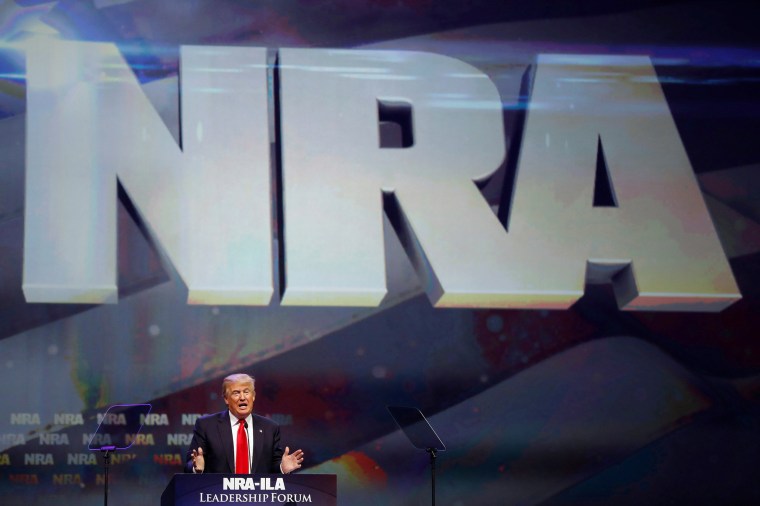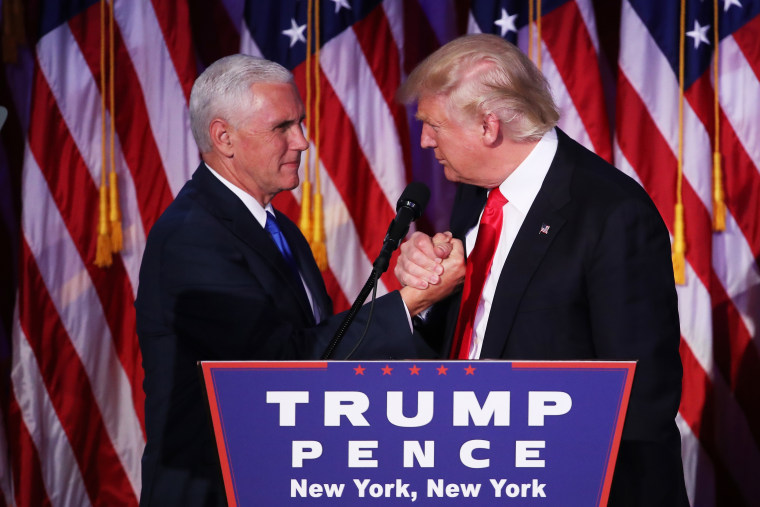Donald Trump, who promised during his campaign to "cancel every unconstitutional executive action, memorandum and order issued by President Obama," could reverse Obama administration policies on criminal justice, immigration, pay for some federal workers and Cuba as soon as he enters the Oval Office.
On policing and health care, Trump’s team can easily suspend some of Obama’s policies, in effect killing off large swathes of what the president has achieved in office.
But the president-elect can’t completely eliminate one of Obama’s signature domestic policy achievements — the Affordable Care Act — without Congress.
It is a complicated process for Trump to stop Obama-backed agreements to reduce climate change and limit Iran’s nuclear weapons program, because those are international deals that involve other nations deeply invested in them.
Related: Obama Races to Protect His Achievements From Trump
“The United States, the most powerful economy in the world, the second-largest emitter of greenhouse gases, must respect the commitments that were made,” French President Francois Hollande said Tuesday, according to the Associated Press, in remarks aimed at Trump and the U.S.
He added,“It’s not simply their duty, it’s in their interest.”
Here's what Trump can and can't do on his own once in the Oval Office.
National Security and Foreign Policy
What Trump can do alone
Obama signed an executive order in 2009 banning so-called black sites — the secret detention facilities that were run by the CIA during the Bush administration. In 2013, Obama issued policy guidance limiting U.S. drone strikes unless there was “near certainty” that civilians would not be harmed.
Without any congressional authorization, Obama took a number of steps over the last two years to normalize relations with Cuba, including allowing U.S. airlines to run direct flights there.
All of these are presidential policies that Trump could reverse immediately if he chose.
Congress has allowed Obama to use drone strikes against suspected terrorists and deploy American forces to fight ISIS with little formal authorization from the legislative branch, which according to the U.S. Constitution is supposed to be the authority that declares war. Trump has said repeatedly he will bomb ISIS strongholds more aggressively than the Obama administration, although he has not given details of this strategy.
Whatever his policy, Trump is likely to have largely unchecked authority in anti-ISIS and counter-terrorism efforts, based on the precedent of the last eight years under Obama.
Trump can also unilaterally kill the Trans-Pacific Partnership, the 12-nation trade agreement that Obama supports but the president-elected opposed during his campaign. Trump can choose whether or not to submit the agreement to Congress, which must ratify U.S. involvement in it. Final approval of the TPP requires at least six of the countries ratify it, and that those countries represent at least 85 percent of the combined GDP of the 12 nations.
The U.S. economy is so large that the ratification process will fall well below that 85 percent without American participation.
Related: How Trump Can Gut Obama's National Security Policies on Day One
Where Trump faces limits
The agreement between the United States and Iran--in which Iran agreed to limits on its nuclear weapons program in exchange for relief from sanctions--also includes five other nations (Britain, China, France, Germany and Russia.) The agreement would not end simply because the United States is not involved, although Iran could withdraw its participation if the U.S. reimposed the sanctions. (In the agreement, some U.S., European Union and United Nations sanctions were lifted. The UN and EU are unlikely to restart those sanctions.)
Similarly, the so-called Paris agreement between more than 100 nations, including the United States, to ensure the planet warms no more 3.6 degrees Fahrenheit is unlikely to end simply because the U.S. withdraws. But Trump could unilaterally end U.S. involvement.
Trump has suggested that U.S military personnel should use whatever techniques are necessary to fight terrorism. But Congress approved and Obama signed a bill in 2015 that is intended to ban so-called enhanced interrogation techniques, such as waterboarding.
Immigration and the Border
What Trump Can Do On His Own
Trump has suggested that he wants to deport as many as three million undocumented immigrants. Presidents generally have wide authority in setting priorities for deportation. Similarly, presidents generally have the power to determine how many refugees the U.S. accepts and from where — although a specific ban on Muslim refugees, which Trump suggested at during the campaign, could be challenged in court.
Trump could also act unilaterally to end Obama's policy of stopping deportations of young people referred to as Dreamers. If Trump suspended the DACA (Deferred Action for Childhood Arrivals) program, it does not mean that the more than 728,000 beneficiaries will be deported, but rather they would lose specific protection from deportation.
“Dreamers would at best thrown back into the shadows. At worst they will be deported,” said Frank Sharry, executive director of the pro-immigration advocacy group America’s Voice. “If that happens immediately, culturally American young people are about to have their lives upended.”
Related: Donald Trump's Deportation Plan Must Still Overcome These Roadblocks
Where He Faces Limits
The deportation force and the border wall Trump campaigned on would likely require need congressional funding.
Related: Donald Trump's Deportation Plan Must Still Overcome These Roadblocks
Gun Control
What Trump Can Do on His Own
Earlier this year, Obama announced a series of executive actions on gun control, ones that he and his aides acknowledged were small-bore measures. The most important of these provisions was one that expanded the definition of who is a gun dealer and therefore must conduct background checks on potential buyers — an attempt to regulate more tightly the growing number of gun sales over the Internet.
Trump could rescind this policy on his first day in office.

The Economy
What Trump Can Do On His Own
Obama used executive actions to require federal contractors to pay at least $10.10 per hour and offer seven days per year of paid sick leave to workers. Another presidential order mandated all businesses offer overtime pay for salaried employees who make less than $48,000 a year.
Trump can unilaterally stop these moves.
Trump’s appointees at the Securities and Exchange Commission and the Consumer Financial Protection Bureau could severely weaken enforcement of key planks of the Dodd-Frank law even if it is not repealed.
Where He Faces Limits
Reversing Obama’s tax hikes on the wealthy — rates increased from 35 to 39.6 percent for individuals with incomes over $400,000 a year and capital gains and estate taxes were also lifted— requires Congress, as do Trump’s plans for major tax cuts on both individuals and corporations.
Criminal Justice
What Trump Could Do On His Own
Changing America's criminal justice system, which liberals and even some conservatives say is unfair to people of color, has been one of Obama's obsessions in his last two years in office. And Trump could undo almost all of Obama's work on the issue.
"He can, for example, roll back tighter background checks on gun purchasers and revoke the limits on keeping juveniles in federal solitary confinement," wrote Bill Keller, editor-in-chief of the Marshall Project, a non-partisan news organization that focuses on criminal justice issues, in a recent piece.
Keller added, "He can repeal Obama’s order to 'ban the box' on federal employment applications that identifies those with criminal records, regarded as a barrier for people who have served their sentences in getting back into the work force. His new attorney general (former New York City Mayor Rudy Giuliani has been mentioned) could swiftly reverse the Obama-era instruction to prosecutors to charge fewer low-level drug crimes and the recent Department of Justice decision to stop using for-profit prisons."
Obama’s Justice Department this summer announced a requirement that federal agents and prosecutors must undergo implicit bias training, a move aimed at reducing racial discrimination that some argue leads to the shooting of unarmed African-Americans by police officers.
An attorney general tapped by Trump could eliminate that requirement. Obama's Justice Department, according to the Marshall Project, has entered into 11 "consent decrees" with local police departments, allowing greater federal oversight on those departments. Those agreements, which usually came after allegations of racially discriminatory practices, do not have to be implemented by the Trump administration.
Where He Faces Limits
Trump suggested during the campaign that he would he look to institute nationwide stop-and-frisk policing practices. Most policing in America is done at the local level, so it’s not clear Trump could do more than encourage police departments to adopt this approach. Expanded stop and frisk would almost certainly be challenged in court because civil rights experts say it is unconstitutional.
Related: How Trump Could Erase Key Parts of Obama's Legacy
Obamacare
What Trump Could Do On His Own
Obama has been encouraging Americans to enroll in health insurance through the Affordable Care Act and calling for states to expand their Medicaid programs as part of the law. Trump’s team could discontinue that outreach, which would likely result in fewer people enrolling in Obamacare.
Where He Faces Limits
Major changes to Obamacare, such as ending its mandate that Americans buy health insurance, require congressional approval.
Related: Repeal Obamacare? Maybe Not, Says Trump
Other Issues
Courts have blocked Obama administration initiatives to ensure that transgender students can use the bathroom of the gender they identify as, impose strict limits on emissions from power plants and grant protection from deportation to about five million undocumented immigrants.
Trump is very unlikely to revive these policies.
